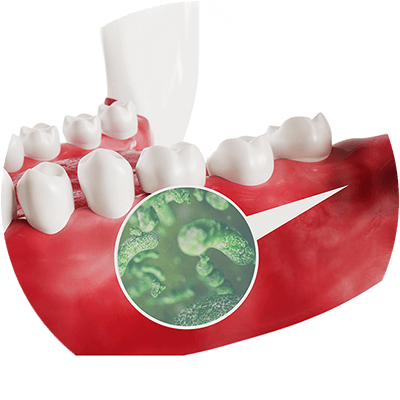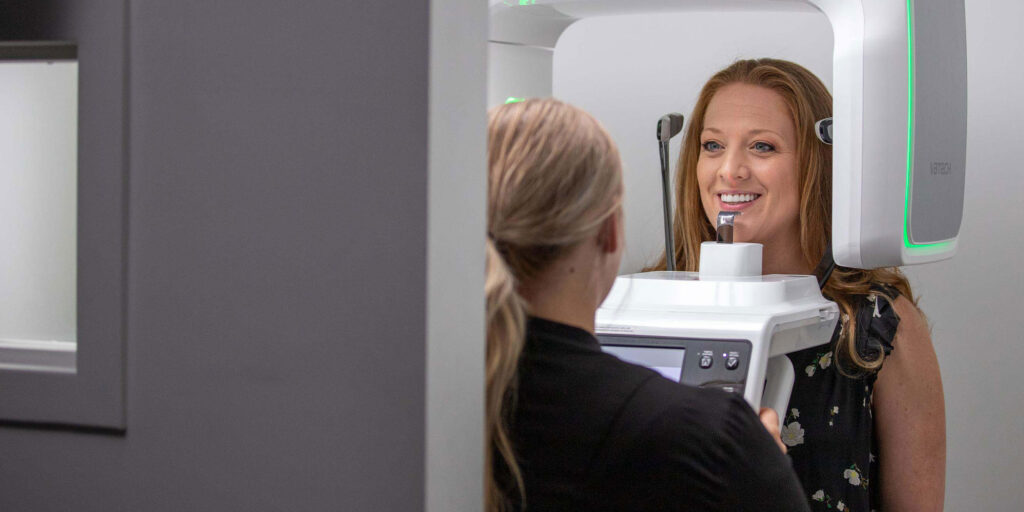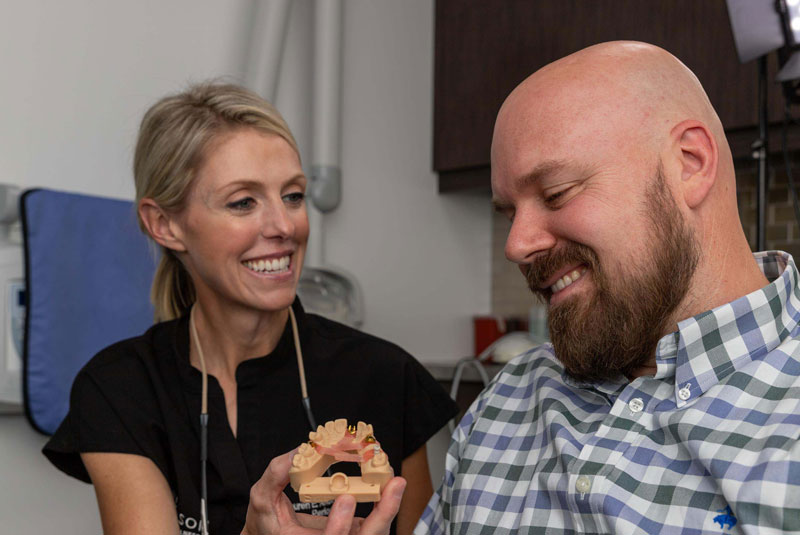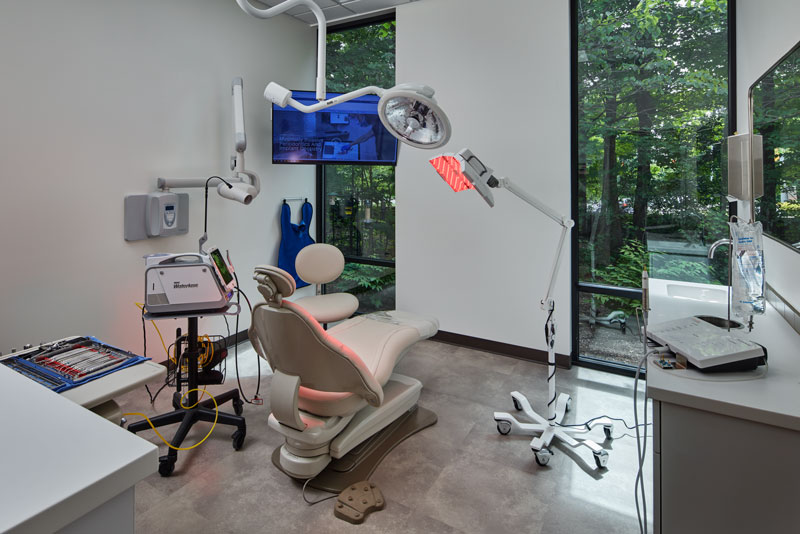
Cavitations, also known as fatty degenerative osteonecrotic jawbone (FDOJ), chronic ischemic jawbone disease (CIBD), or neuralgia-inducing cavitational osteonecrosis (NICO), are areas in the jawbone where the bone hasn’t healed properly after a tooth extraction or trauma. Think of them as hollow spots or areas of poorly healed bone, which can sometimes harbor infection or interfere with the surrounding tissue. They’re most commonly found in places like wisdom tooth extraction sites or other areas where the healing process didn’t go as planned.
Cavitations occur for various reasons, including improper healing after tooth removal, insufficient blood flow to the area, or infections that weren’t fully treated. Sometimes, our bodies don’t always heal perfectly, especially when conditions like gum disease or poor nutrition come into play. If left untreated, these areas can sometimes cause lingering pain or even systemic issues, so it’s important to address them with care.
Fortunately, Dr. Lauren Anderson at Anderson Periodontal Wellness specializes in diagnosing and treating cavitations. With her expertise, she and our team can help restore proper healing, alleviate discomfort, and support your oral health!

Treating cavitations is crucial because these areas of poorly healed or infected bone can significantly impact oral and overall health. Left untreated, cavitations may harbor bacteria or toxins, contributing to chronic pain and inflammation in the jaw.
Beyond localized symptoms, cavitations have been associated with systemic health issues, such as persistent fatigue, immune system dysfunction, and even autoimmune conditions. Dr. Anderson is skilled in diagnosing and treating cavitations, helping to promote proper healing, alleviate discomfort, and reduce the risk of broader health complications!

Cavitations are diagnosed using advanced imaging techniques, clinical evaluations, and sometimes culture biopsies. Cone Beam Computed Tomography (CBCT) is a cutting-edge 3D imaging tool that provides detailed views of the jawbone, helping Dr. Anderson identify areas of bone loss or poorly healed extraction sites indicative of cavitations.
Another diagnostic method, thermography, detects abnormal temperature patterns that may suggest underlying inflammation or infection. In some cases, a culture biopsy can be used to identify specific bacterial activity within the affected area. Regular dental visits are crucial for early detection, as they allow us to monitor jawbone health, address potential symptoms promptly, and prevent complications that could arise from undiagnosed cavitations.
We treat cavitations using the Mectron PiezoSurgery device, a cutting-edge surgical tool with piezoelectric technology. This advanced device treats cavitations using ultrasonic micro-vibrations to precisely remove infected or necrotic bone tissue from the cavitation site while minimizing damage to surrounding soft tissues like nerves and blood vessels.
By using PiezoSurgery, we can effectively access and clean cavitation sites while promoting optimal healing conditions. This minimally invasive approach ensures safe, efficient treatment and enhances patient comfort during and after the procedure.
At Anderson Periodontal Wellness, we use ozone therapy as an effective treatment for cavitations. Ozone therapy promotes blood flow to the affected area, supporting the body’s natural healing process.
It also reduces inflammation and eliminates harmful bacteria, creating an optimal environment for proper bone regeneration. This minimally invasive approach allows Dr. Anderson to treat cavitations while enhancing overall oral health.
We also use Platelet-Rich Fibrin (PRF) therapy to enhance the healing process when treating cavitations. PRF is derived from a small sample of your blood and contains concentrated platelets and growth factors that promote tissue regeneration and bone healing.
When applied to the cavitation site, PRF stimulates natural healing, reduces inflammation, and supports long-term recovery. This advanced technique allows Dr. Anderson to provide safe, effective treatment while improving your overall oral health outcomes.
We use advanced dental lasers to treat cavitations with precision and care. Dental lasers allow Dr. Anderson to access the cavitation site and gently remove diseased or infected tissue without damaging the surrounding healthy bone.
This minimally invasive approach promotes faster healing, reduces discomfort, and minimizes the risk of infection. By utilizing cutting-edge laser technology, we ensure a safe and effective treatment to restore your oral health.

Choosing a periodontist like Dr. Anderson in Bloomfield Hills, MI, is crucial for precise, accurate, and minimally invasive cavitation treatment. Our expertise in diagnosing and treating cavitations ensures you receive tailored care to address the root cause of the issue, preventing further complications.
By utilizing advanced technology such as the Mectron Piezo, the treatment is performed with greater precision, minimizing damage to surrounding tissue and promoting faster healing. This minimally invasive approach reduces the need for extensive surgery, helping patients recover more quickly and comfortably. With a focus on long-term oral health and patient comfort, Dr. Anderson offers a comprehensive solution to cavitation issues using the latest advancements in periodontal care.
Expertise in Biological Dentistry – Dr. Anderson is trained in Biodentistry 3.0 and certified in Swiss Dental Ceramics, ensuring a holistic and biocompatible approach to periodontal care.
Highest Level of Certification – As a Diplomate of the American Board of Periodontology and a Michigan Board-Certified Periodontist, Dr. Anderson has achieved the highest levels of professional accreditation in her field.
Cutting-Edge Techniques & Innovations – With published research and lectures on implant-related soft tissue augmentation, peri-implant disease prevention, and airway-focused periodontics, Dr. Anderson integrates the latest advancements into her patient care.
Multi-Disciplinary & Holistic Approach – Dr. Anderson collaborates with experts across dentistry and medicine to ensure comprehensive, whole-body health solutions for her patients.
Minimally Invasive & Biocompatible Treatments – With specialized training in advanced ceramic implants and biological dentistry techniques, Dr. Anderson prioritizes treatments that support the body’s natural healing processes.
Commitment to Patient-Centered Care – Passionate about education and personalized treatment plans, Dr. Anderson empowers her patients with knowledge and customized solutions for optimal oral and systemic health.
Treatment begins with identifying the cavitation using advanced imaging, followed by using the Mectron PiezoSurgery device. This tool applies ultrasonic micro-vibrations to gently and precisely remove dead or infected bone while preserving nearby nerves and healthy tissue—creating ideal conditions for healing.
Dr. Anderson uses Cone Beam CT (CBCT) for detailed 3D imaging, thermography for detecting inflammation, and, if necessary, culture biopsies to identify bacterial activity. These tools ensure accurate diagnosis and allow for targeted, minimally invasive treatment.
Cavitations are treated with PiezoSurgery, a precise ultrasonic tool, along with adjunctive therapies like Ozone Therapy, Platelet-Rich Fibrin (PRF), and dental lasers. These technologies clean the site, reduce infection risk, and stimulate healing naturally and safely.
Thanks to the minimally invasive approach using PiezoSurgery and healing aids like PRF, recovery is often smoother and faster than traditional surgery. Patients typically report reduced swelling, less discomfort, and a quicker return to normal activities.
Cavitations occur when a bone doesn’t heal properly after an extraction—often due to poor blood flow, infection, or incomplete cleaning of the socket. These hollow, damaged areas can harbor bacteria and disrupt jawbone and immune health if left untreated.
Yes. Cavitations may trap bacteria or toxins, triggering persistent pain, inflammation, or even systemic issues like fatigue and immune dysfunction. Treating the cavitation helps eliminate the source of irritation and supports full-body wellness.
Emerging research and clinical experience suggest untreated cavitations may contribute to broader health issues such as chronic fatigue, autoimmune conditions, or inflammatory symptoms. Proper diagnosis and treatment can reduce these risks and improve both oral and overall health.
Early treatment helps prevent bacterial spread, chronic inflammation, or damage to adjacent bone and tissue. Addressing cavitations quickly improves outcomes, reduces discomfort, and lowers the risk of long-term complications.
Dr. Anderson uses cutting-edge diagnostics, PiezoSurgery, and regenerative therapies to tailor treatment to each patient. The minimally invasive approach protects surrounding tissue and promotes faster, healthier recovery—backed by periodontal expertise.
If you’ve had a tooth extraction, persistent jaw pain, or unexplained symptoms, now is the time to schedule a consultation. Early detection ensures less invasive treatment and helps preserve long-term oral and systemic health.

I understand the information disclosed in this form may be subject to re-disclosure and may no longer be protected by HIPAA privacy regulations and the HITECH Act.
